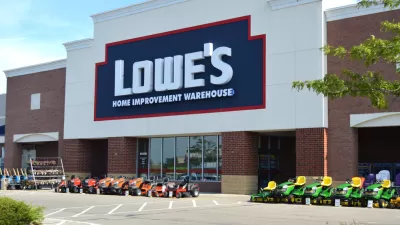"Dark store theory" argues that nearby depreciated properties should figure into property valuations. The resulting property tax cuts mean local municipalities end up taking a huge hit.

Laura Bliss reports on the efforts of big-box retailers across the country to lower property taxes by filing property assessment appeals using a contentious idea known as “dark store theory.” “With one property tax appeal after another, they are compelling small-town assessors and high-court judges to accept the novel argument that their bustling big boxes should be valued like vacant ‘dark’ stores—i.e., the near-worthless properties now peppering America’s shopping plazas.”
As a result of these appeals, municipalities are looking at potential property value losses ranging from millions to billions of dollars. The lost taxes and back taxes they would have to pay retailers — including Walmart, Target, Meijer, and Menards — would result in the financial burden being foisted onto residents through higher property taxes and cuts in local services.
Bliss says that many local governments have sought to avoid litigation costs by at least partially reducing assessed property values:
Yet dark store theory appeals have been incessant, and small towns feel outgunned. Retailers come back, year after year, insisting on paying less, even after they’ve been granted reductions. For them, every demand brings the opportunity for a lower valuation, and there’s no real financial downside, with outside tax lawyers working for contingency fees.
Municipalities also often provide subsidies and tax breaks to attract these businesses, with the expectation that rising property values will provide a return on their investments. However, a property tax decrease means a community will not benefit from any cost outlays and, in some cases, it could face debt.
Bliss says the Upper Midwest has been hit especially hard by this tactic, as the Great Recession left vacant retail buildings in many communities. "And dark store theory may be bigger than big boxes: As challenges spread geographically, city administrators fear the tactic will catch on among other property classes, with fast food outlets, banks, grocery stores, and office buildings deploying similar arguments in an effort to slash their tax obligations."
While government officials in some states are working on legislation to protect local communities, Bliss says documentation of the assessment process and the evidence used to come up with property values is a good short-term strategy for municipalities facing dark store theory challenges.
FULL STORY: After the Retail Apocalypse, Prepare for the Property Tax Meltdown

Maui's Vacation Rental Debate Turns Ugly
Verbal attacks, misinformation campaigns and fistfights plague a high-stakes debate to convert thousands of vacation rentals into long-term housing.

Planetizen Federal Action Tracker
A weekly monitor of how Trump’s orders and actions are impacting planners and planning in America.

Chicago’s Ghost Rails
Just beneath the surface of the modern city lie the remnants of its expansive early 20th-century streetcar system.

Bend, Oregon Zoning Reforms Prioritize Small-Scale Housing
The city altered its zoning code to allow multi-family housing and eliminated parking mandates citywide.

Amtrak Cutting Jobs, Funding to High-Speed Rail
The agency plans to cut 10 percent of its workforce and has confirmed it will not fund new high-speed rail projects.

LA Denies Basic Services to Unhoused Residents
The city has repeatedly failed to respond to requests for trash pickup at encampment sites, and eliminated a program that provided mobile showers and toilets.
Urban Design for Planners 1: Software Tools
This six-course series explores essential urban design concepts using open source software and equips planners with the tools they need to participate fully in the urban design process.
Planning for Universal Design
Learn the tools for implementing Universal Design in planning regulations.
planning NEXT
Appalachian Highlands Housing Partners
Mpact (founded as Rail~Volution)
City of Camden Redevelopment Agency
City of Astoria
City of Portland
City of Laramie





























